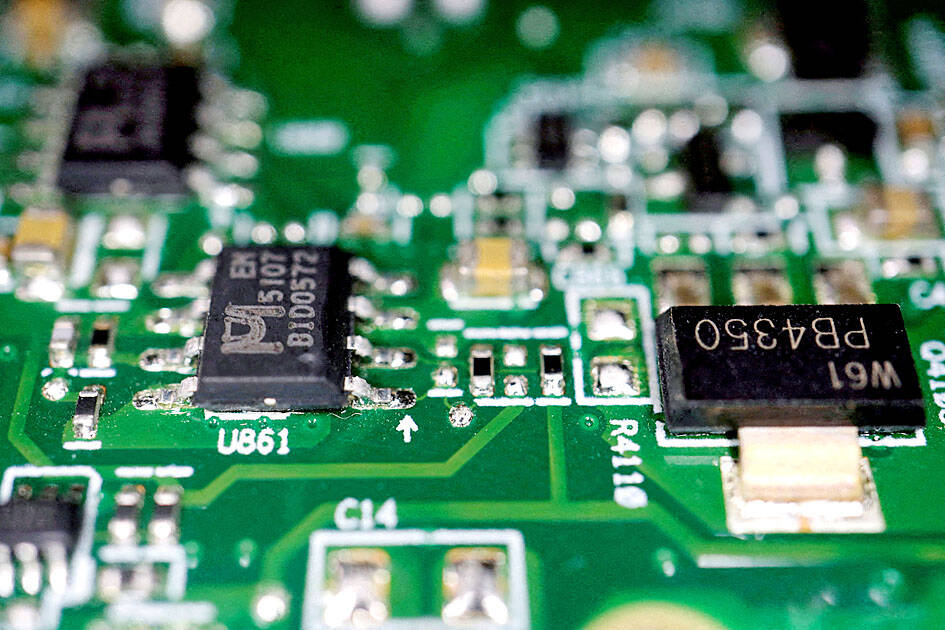The production value of Taiwan’s printed circuit board (PCB) industry is expected to expand 12 percent annually this year to NT$915.7 billion (US$30.11 billion), driven primarily by strong demand for artificial intelligence (AI) servers, the Taiwan Printed Circuit Association said yesterday.
The latest growth forecast outpaced the 4.6 percent year-on-year increase the association estimated in March, as the industry’s production value in the second quarter jumped 14.4 percent to a record NT$218.2 billion on the back of strong demand for high-end products, the association said in a statement.
That came as integrated circuit (IC) substrates outgrew all other types of PCBs and recorded an annual gain of 20.6 percent in production value during the June quarter, the association said.

Photo: REUTERS
Growing demand for IC substrates for memory chips, graphic cards, AI chips and switch ICs amid higher shipments of smartphones, AI servers and PCs were the main factors, it said.
With strong growth momentum, the industry’s production value in the second half of the year is projected to climb 10.7 percent annually to NT$492.1 billion, thanks to wider adoption of AI applications and the rise of emerging technologies such as satellite communications, the association said.
“For the whole year, AI servers will be the main growth engine, boosting the overall PCB shipments to surge 82.8 percent year-on-year,” it said. “The specification upgrade is to stimulate demand.”
Additionally, robust demand for high-performance computing devices, satellites and automotive electronics would also help boost the industry’s growth this year, the association said.
However, the booming AI application demand is causing a supply bottleneck for critical PCB materials, including high-performance glass fiber and high-volumetric-low-profile (HVLP) copper clad laminates (CCLs), it said, adding that the situation could disrupt AI server shipments.
While new AI servers powered by Nvidia Corp’s B300 chips would significantly boost demand for HVLP CCLs, it is likely to trigger concern over supply constraints of such CCLs in the mid term, the association said.
As Taiwan is heavily reliant on Japanese suppliers for those critical raw materials, AI servers are facing the risk of production disruptions, it said.
The association has activated a special project to encourage local PCB companies to tap into high-value raw material areas, with an aim to develop an extensive PCB supply chain in Taiwan, it added.
Last year, the PCB industry’s production value expanded 6.1 percent to NT$816.8 billion, after suffering a recession in 2023, the association said.

KEEPING UP: The acquisition of a cleanroom in Taiwan would enable Micron to increase production in a market where demand continues to outpace supply, a Micron official said Micron Technology Inc has signed a letter of intent to buy a fabrication site in Taiwan from Powerchip Semiconductor Manufacturing Corp (力積電) for US$1.8 billion to expand its production of memory chips. Micron would take control of the P5 site in Miaoli County’s Tongluo Township (銅鑼) and plans to ramp up DRAM production in phases after the transaction closes in the second quarter, the company said in a statement on Saturday. The acquisition includes an existing 12 inch fab cleanroom of 27,871m2 and would further position Micron to address growing global demand for memory solutions, the company said. Micron expects the transaction to

Vincent Wei led fellow Singaporean farmers around an empty Malaysian plot, laying out plans for a greenhouse and rows of leafy vegetables. What he pitched was not just space for crops, but a lifeline for growers struggling to make ends meet in a city-state with high prices and little vacant land. The future agriculture hub is part of a joint special economic zone launched last year by the two neighbors, expected to cost US$123 million and produce 10,000 tonnes of fresh produce annually. It is attracting Singaporean farmers with promises of cheaper land, labor and energy just over the border.

US actor Matthew McConaughey has filed recordings of his image and voice with US patent authorities to protect them from unauthorized usage by artificial intelligence (AI) platforms, a representative said earlier this week. Several video clips and audio recordings were registered by the commercial arm of the Just Keep Livin’ Foundation, a non-profit created by the Oscar-winning actor and his wife, Camila, according to the US Patent and Trademark Office database. Many artists are increasingly concerned about the uncontrolled use of their image via generative AI since the rollout of ChatGPT and other AI-powered tools. Several US states have adopted

A proposed billionaires’ tax in California has ignited a political uproar in Silicon Valley, with tech titans threatening to leave the state while California Governor Gavin Newsom of the Democratic Party maneuvers to defeat a levy that he fears would lead to an exodus of wealth. A technology mecca, California has more billionaires than any other US state — a few hundred, by some estimates. About half its personal income tax revenue, a financial backbone in the nearly US$350 billion budget, comes from the top 1 percent of earners. A large healthcare union is attempting to place a proposal before